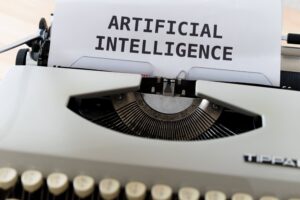I’d been planning to write a post about artificial intelligence (AI) for quite a while, but I was so busy with work that it just got put on the back burner. Last week, however, I was speaking to a good friend, a physicist and programmer, who brought up the topic of AI. He said that in the past, whenever he encountered a problem at work, he would consult with a colleague. Now, he simply confers with ChatGPT. Naturally, he asked if I also used AI in my work. A few days later, my uncle, a physicist and accountant (I’m beginning to see the common denominator 😉), complimented me on my new website but suggested that I add a post about AI. So here we are.

Yes, I do use artificial intelligence software from time to time in my work, like when I’m writing marketing content for a company, or when I’ve been asked to write the abstract for a researcher’s academic article. But although these tools can be helpful, they cannot replace me (nor would I want them to. I love my job).
To demonstrate how AI apps can be used for writing, I asked ChatGPT to “Write a short poem about Beverley the talented copywriter”. Within seconds, I received the following output:
In the realm of copy, she reigns supreme,
A maestro of language, a creator’s dream.
Her words dance on pages, a lyrical trance,
Crafting stories that make hearts dance.
I couldn’t have said it better myself 😉
Here’s another example, with the same instruction, but this time using Google Bard:
From catchy slogans to captivating prose,
She paints a picture, where desire grows.
Building brands with every line,
A master storyteller, truly divine.
If you’re not familiar with these tools, think of those amusing scenes from movies and TV shows, where the guy speaks to his smartphone and asks Siri or Alexa (depending on the type of phone he has) to book a table at a restaurant for him and a friend. Instead, she invites a girl that he secretly likes out on a date; or when he asks her to reply to his mum’s email to say that sadly, he won’t be able to make their annual family get-together. But instead, she writes: “Hi Mum, yes, I’ll definitely be there. Can’t wait to see everyone.” When this happens to someone else, it’s very amusing. And Siri and Alexa are great examples of AI-based applications.
But what is AI?
Simply put, the term “artificial intelligence” or AI refers to systems and technologies that are able to imitate human intelligence based on the vast quantities of data that are so readily available nowadays, with the aim of increasing the speed and efficiency of performing a given task.
As I am a linguist at heart and words are my bread and butter, I decided to look this term up in the Merriam Webster dictionary (or what I like to refer to as my bible). In the 11th edition, the term “artificial intelligence” appears as a discrete entry, between “artificial insemination” and “artificial respiration.”
When I think of the researchers who coined this term in 1956, I’m sure they didn’t imagine, even in their wildest dreams, that this term would become one of the hottest buzzwords of the 21st century, or that things that were only thought of in science fiction would one day become a reality.
